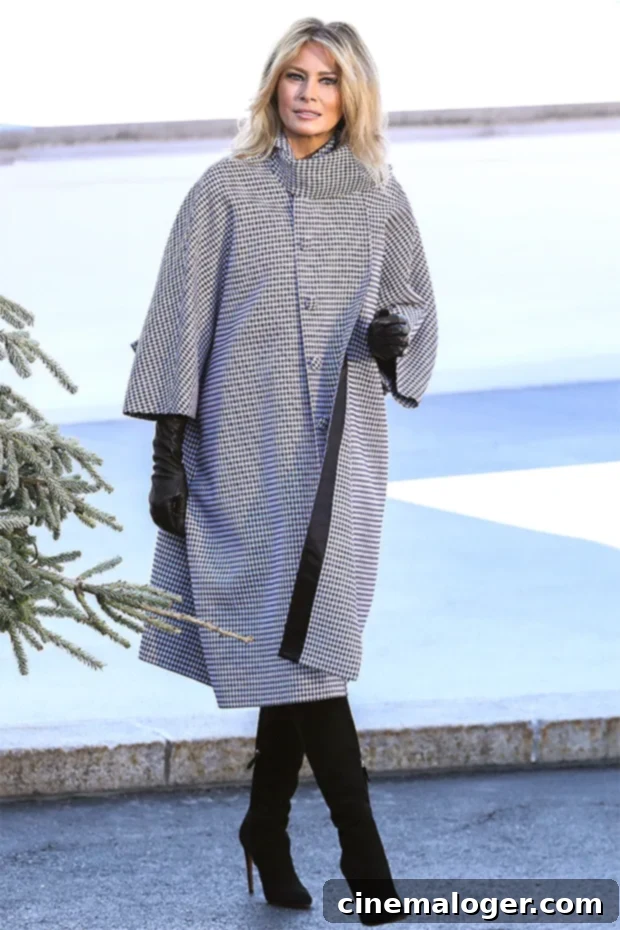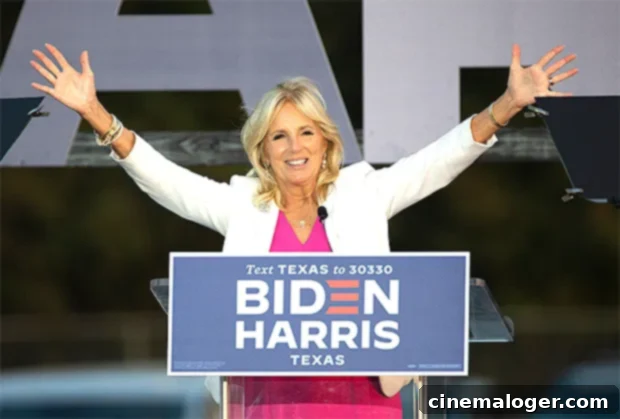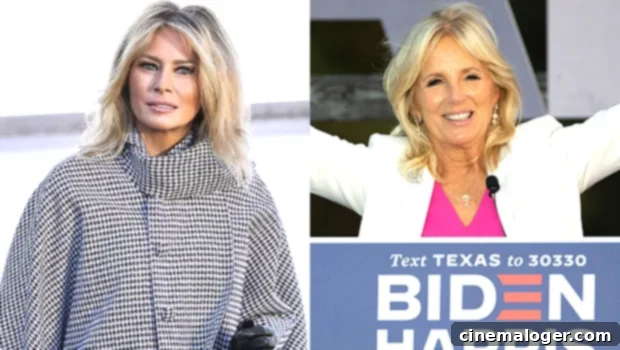Melania Trump Breaks Decades-Long White House Tradition, Declines Residence Tour for Incoming First Lady Dr. Jill Biden Amidst Strained Transition
In a significant departure from longstanding White House custom, Melania Trump reportedly chose not to extend the traditional courtesy of a residence tour and welcoming tea to the incoming First Lady, Dr. Jill Biden. This unprecedented decision highlights the deep tensions characterizing the transition between the Trump and Biden administrations, marking yet another break from the established norms of presidential changeovers. A spokesperson for the Biden campaign reportedly confirmed to Daily Mail that no such invitation for a tour of the private residence or a social tea with Dr. Biden was offered, reinforcing the acrimonious nature of the handover.
The White House residence tour, often accompanied by tea and a private chat, is a cherished tradition that has facilitated smooth transitions for incoming First Ladies for decades, irrespective of political party affiliation. This custom dates back at least as far as the gracious meeting between Bess Truman and Mamie Eisenhower. The tour serves a crucial purpose: to acclimate the incoming First Lady to the historic private quarters where her family will reside and to offer invaluable insights into the unique demands and logistics of life within 1600 Pennsylvania Avenue. It’s a moment of shared experience and institutional knowledge transfer, designed to ease the transition into one of the world’s most scrutinized public roles. This act of welcoming has always been seen as a gesture of respect for the office itself, transcending personal or partisan differences, ensuring a seamless continuity for an office that profoundly impacts American public life.
This news emerged amidst reports that Melania Trump was “digging in” and “not interested in playing the traditional role of a first lady,” as stated in a January 14 CNN report. Such a stance, culminating in the omission of the traditional tour, stands in stark contrast to the expectations associated with the office. Furthermore, Melania Trump’s tenure concluded with an approval rating of 47%, positioning her as the First Lady with the lowest favorability rating in modern history, according to CNN. This figure notably trails her two immediate predecessors, Michelle Obama and Laura Bush, who enjoyed approval ratings of 69% and 67% respectively. This historically low favorability rating underscores a public perception that may have influenced, or been influenced by, her approach to the traditional duties and courtesies of the First Lady. HollywoodLife attempted to reach out to both the Biden press office and the White House for comment on this significant development, but did not receive a response by the time of publication.

The absence of this customary invitation marks a historical precedent, placing Melania Trump in a unique position among modern First Ladies. As CNN columnist Kate Andersen Brower aptly observed on January 18, “Melania Trump will become the first modern first lady not to invite the woman who will replace her to the White House for a walk-through of the private living quarters on the second and third floors.” This break with tradition is particularly striking when recalling the gracious conduct of Michelle Obama, who warmly welcomed Melania Trump to the White House for the customary tour and tea following the 2016 Presidential Election. This gesture from Mrs. Obama came despite the contentious political climate and the persistent “birtherism conspiracy” promoted by then-candidate Donald Trump throughout the Obama administration. Mrs. Obama’s actions underscored a profound commitment to the institution and its decorum above personal or political differences, setting a powerful example of unity and respect during a period of intense division.
Indeed, the spirit of respectful transition extended beyond the First Ladies in 2016. President Barack Obama also held a meeting with Donald Trump, extending a courtesy that Mr. Trump, as the outgoing President, notably did not reciprocate to President-elect Joe Biden. The collective failure of both the outgoing President and First Lady to participate in these long-held transitional rituals signals a profound departure from the principles of peaceful and cooperative transfers of power that have historically defined American democracy. These actions set a tone that affects not only the incoming administration’s ability to smoothly take the reins but also the public’s perception of national unity and institutional respect. Such omissions can undermine confidence in the democratic process and perpetuate divisions, leaving a lasting impact on future transitions.
The office of the First Lady, though not constitutionally defined, plays a vital role in American public life, often serving as a symbol of compassion, advocacy, and national unity. A smooth transition between First Ladies is not merely a social nicety; it is an important act of ensuring the continuity and integrity of the office. The tour and tea traditionally provide a unique opportunity for the outgoing First Lady to share practical advice, insights into managing the residence staff, navigating public expectations, and handling the immense pressure that comes with the role. Without this customary guidance, the incoming First Lady, even one as experienced and accomplished as Dr. Jill Biden, may face unnecessary challenges in her initial weeks and months. This deliberate omission suggests a disregard not just for Dr. Biden personally, but for the very traditions that uphold the decorum and stability of the First Lady’s office, potentially setting a concerning precedent for future administrations.

Melania Trump’s decision to bypass these time-honored courtesies has not gone unnoticed by the public, sparking widespread commentary and criticism, with reports indicating it has been “dragged on social media.” Beyond the formal omission of the tour, Melania had reportedly made no personal effort to reach out to her successor, Dr. Biden. Furthermore, the First Lady’s office showed little to no indication of assisting Dr. Biden’s team with transitional efforts, according to the same January 14 CNN report. This lack of engagement extends beyond mere formality, touching upon a perceived absence of good faith and institutional continuity. The First Lady’s office typically provides crucial administrative and logistical support during a transition, ensuring a seamless handover of responsibilities, staff, and projects. The reported lack of cooperation further underscores the contentious nature of this particular shift in power, creating unnecessary obstacles for the incoming First Lady and her staff.
Adding another layer of complexity to her departure, Melania Trump released a “farewell” message on Twitter just days before the inauguration. In this message, she expressed pride in representing “a nation with such kind and generous people,” and unequivocally stated that “violence is never the answer, and will never be justified.” This statement came in the immediate aftermath of the January 6 Capitol Hill insurrection, an event that deeply shook the nation and was widely attributed to rhetoric from the outgoing administration. The stark contrast between her public appeal for kindness and consideration, and her private actions regarding the incoming First Lady, left many observers perplexed and questioning the sincerity of her words. Her call to “use every opportunity to show consideration for another person” resonated hollowly against the backdrop of her own reported unwillingness to extend a basic courtesy to Dr. Biden, leading to accusations of hypocrisy and a further erosion of goodwill during an already fraught national moment.
A Farewell Message from First Lady Melania Trump pic.twitter.com/WfG1zg2mt4
— Melania Trump (@FLOTUS) January 18, 2021
As the Trump administration concluded its term, the future of Melania Trump’s “Be Best” campaign, focused on children’s well-being, remained undisclosed. However, the path ahead for Dr. Jill Biden is already groundbreaking and reflects a modern evolution of the First Lady role. She is set to make history as the first First Lady to hold a full-time job outside the White House, continuing her role as a professor at a community college. Additionally, she plans to maintain her dedicated work with military families, all while diligently executing the multifaceted duties inherent to the office of the First Lady. Dr. Biden’s commitment to her professional career and public service demonstrates a modern approach to the role, emphasizing continued engagement and breaking new ground for future First Ladies. Her unique background as an educator and advocate positions her to bring a fresh perspective to the East Wing, focusing on initiatives that directly impact education and military families, potentially redefining the scope and influence of the First Lady’s office for a new generation.
This stark contrast between the outgoing and incoming First Ladies — one leaving with a notable disregard for tradition and a low approval rating, and the other poised to redefine the role with unprecedented professional engagement — underscores a significant moment in the history of the First Lady’s office. While the lack of traditional courtesies from Melania Trump presents an unusual challenge, Dr. Jill Biden’s demonstrated resilience, extensive experience, and unwavering commitment suggest she is well-prepared to navigate these circumstances. The transition, though strained on a personal and political level, ultimately highlights the enduring strength of the institutions and the capacity of incoming leaders to forge their own paths, even without the customary guiding hand of their predecessors. The enduring question remains how this particular break from tradition will be viewed in the broader historical narrative of presidential transitions and the evolution of the First Lady’s role, and what implications it holds for the future of White House decorum and inter-administration relations.
